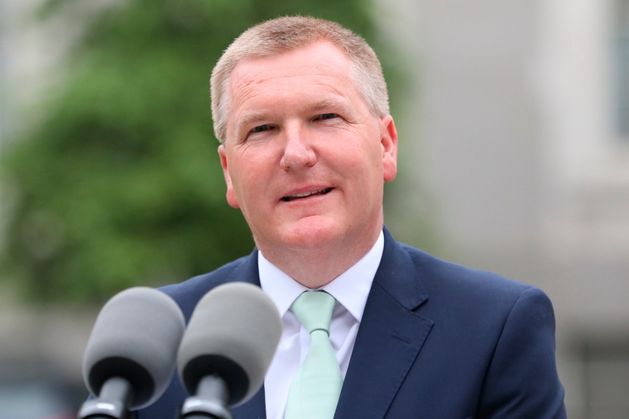


European Commission President Ursula von der Leyen has assigned jobs in the EU’s executive body, confirming which countries’ representatives will win powerful roles on trade, competition and the green agenda.
Ireland’s EU Commission nominee Michael McGrath had previously admitted a portfolio in the finance or economics areas would best suit his political experience and Ireland’s interests.
The Cork South Central TD was nominated by the Government for a EU Commission post and was replaced in Cabinet earlier this year by new Finance Minister Jack Chambers.
Mr McGrath will lead the EU’s work on anti-corruption with the Democracy, Justice and the Rule of Law portfolio, Ms von der Leyen has said.
She said: “I have entrusted him with the responsibility to take forward the European Democracy Shield.
“He will also lead our work on the rule of law, anti-corruption and consumer protection.”
Ms von der Leyen met with leaders of the European Parliament political groups in Strasbourg this morning.
Ms von der Leyen named Spain’s ecological transition minister Teresa Ribera as the bloc’s next antitrust commissioner while Estonia’s Kaja Kallas will be in charge of foreign policy.
Lithuania’s Andrius Kubilius will become the EU’s first defence commissioner – a new role designed to build up European military manufacturing capacity in the face of Russian aggression in Europe’s eastern flank.
Other names on the list of EU Commissioners include French Foreign Minister Stephane Sejourne in charge of industrial strategy, while Slovakia’s Maros Sefcovic will oversee trade policies.
The Commission is the 27-country European Union’s most powerful institution. It has the power to propose new EU laws, block mergers between companies and sign free trade deals.
Each EU member state will have one seat at the Commission’s table, a role comparable to a government minister, although its political weight varies greatly depending on the portfolio.
All candidates will undergo hearings with lawmakers in the European Parliament who have to sign off on their nomination.
Ribera will need to fill the footsteps of Denmark’s long-serving antitrust chief Margrethe Vestager, who in recent years stepped up the pressure on Big Tech to allow fair competition on its platforms.
Today’s News in 90 seconds – 17th September 2024
She will also oversee the EU’s stance on foreign subsidies, another hot-button issue as companies in key sectors like electric vehicles and energy production are struggling to defend their business models against cheap competition from abroad, particularly from China.
All commissioners will report to German conservative von der Leyen, who this summer was handed a second term as EU chief executive by member states after her political camp won the most votes in EU elections.
The next EU Commission is expected to take office by the end of the year, meaning one of its first tasks will be fielding the outcome of the U.S. presidential election in November.
A second Trump presidency could sharply alter Western unity on supporting Ukraine against Russia’s invasion and up-end EU trade relations with the world’s biggest economy.
There was some drama on Monday on the next Commission’s line-up, when France picked Foreign Minister Stephane Sejourne as its new candidate after the incumbent, Thierry Breton, abruptly quit with tough words for von der Leyen.